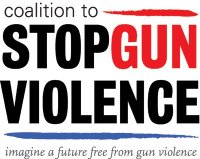 | |
| Merged into | Johns Hopkins Center for Gun Violence Solutions |
|---|---|
| Formation | 1974 |
| Dissolved | 2022 |
| Headquarters | Washington, D.C. |
| Membership | 48 organizations |
| Website | www |
The Coalition to Stop Gun Violence (CSGV) and the Educational Fund to Stop Gun Violence (EFSGV or Ed Fund), its sister organization, were two parts of a national, non-profit gun control advocacy organization opposed to gun violence. Since 1974, it supported reduction in American gun violence via education and legislation. They ceased operations in 2022 after the EFSGV merged with the Johns Hopkins Center for Gun Violence Prevention and Policy to become the Johns Hopkins Center for Gun Violence Solutions. [1]